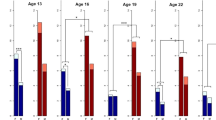Abstract
In the past few years, the introduction and rapid acceptance of puberty suppression has transformed the clinical treatment of children diagnosed with Gender Identity Disorder. This essay analyzes the narratives used by some advocates of this treatment, particularly the elements of saving children from the looming disaster of puberty and from future abject lives of violence and suicide as transgender adults. It briefly addresses the potential implications of this account for the well being of the children brought under clinical purview.
Similar content being viewed by others
References
Fassin, Didier. 2011. Humanitarian Reason: a Moral History of the Present. Berkeley: University of California Press.
Giordano, Simona. 2008. “Lives in a Chiaroscuro. Should We Suspend the Puberty of Children with Gender Identity Disorder?” Journal of Medical Ethics 34 (8): 580–584.
Kleinman, Arthur, and Joan Kleinman. 1997. “The Appeal of Experience; The Dismay of Images: Cultural Appropriations of Suffering in Our Times.” In Social Suffering, edited by Arthur Kleinman, Veena Das, and Margaret Lock, 1–23. Berkeley: University of California Press.
Malkki, Lissa. 2010. “Children, Humanity, and the Infantilization of Peace.” In In the Name of Humanity: The Government of Threat and Care, edited by Ilana Feldman and Miriam Ticktin, 58–85. Durham: Duke University Press.
Mathers, Kathryn. 2012. “Mr. Kristof, I Presume?” Transition: An International Review (107): 15–31.
Stephens, Sharon. 1995. “Children and the Politics of Culture in ‘Late Capitalism’.” In Children and the Politics of Culture, edited by Sharon Stephens, 3–48. Princeton, N.J.: Princeton University Press.
Ticktin, Miriam Iris. 2011. Casualties of Care: Immigration and the Politics of Humanitarianism in France. Berkeley: University of California Press.
Vance, Carole. 2011. “Thinking Trafficking, Thinking Sex.” GLQ: A Journal of Lesbian and Gay Studies 17 (1): 135–143.
Vance, Carole. 2012. “Innocence and Experience: Melodramatic Narratives of Sex Trafficking and Their Consequences for Law and Policy.” History of the Present: A Journal of Critical History 2 (2).
Wheeler, Nicholas. 2000. Saving Strangers: Humanitarian Intervention in International Society. Oxford University Press, USA.
Acknowledgments
Special thanks to Carole Vance and Rebecca Jordan-Young for detailed suggestions and comments. Thanks to Katrina Karkazis, Chavisa Woods and Manijeh Moradian for helpful comments. The responsibility for the content of this article remains with author.
Endnotes
1 Currently the terms “gender variant” children, “gender non-conforming” children, children with “Gender Identity Disorder” and “transgender children” are used by different actors to refer to children with gender atypical and/or cross gender interests, behaviors and desires. “Gender Identity Disorder” and “transgender children” often imply greater intensity of cross gender interests or a desire to be the other gender and suggest a clinical undertone. In the past few years there have been a small number of children who have transitioned to live as the other gender. These terms are recent, and their definitions and boundaries are contested and shifting. Since there is no consensus over the differential application of these terms to the variety of gender atypical children, I will most often use the term “gender non-conforming” throughout this essay as an umbrella term.
2 This article intervened in the debates over “puberty suppression” in the UK, where the National Health Service (NHS) declined to provide puberty blockers to children diagnosed with Gender Identity Disorder. The debate was resolved after years of intensive advocacy in January 2012 when the British NHS made the decision to permit and provide puberty suppression treatment for children, available through the centralized national health system.
3 Currently, in the clinical debates, “transgender” has replaced the older term “transsexual”, i.e., a person who medically transitions, whereas “transgender” originally stood as an umbrella term for all gender non-conforming people. Since clinicians acknowledge the gender non-conforming childhoods of some gay adults, the diagnostic dilemma is whether these gender non-conforming children will grow to be “gay” or “transgender.” If the latter, “puberty suppression” followed by cross-sex hormones and later surgery, is considered an appropriate treatment. If the former, such treatment would not be warranted. Critics of puberty suppression often argue that clinicians might be treating children who might simply end up as gay adults. Still other outcomes or futures are not imagined or discussed, for example, experiencing degrees of gender non-conformity without full medical transition or any at all. Clinicians’ familiarity with transgenderism is often limited to those adults who seek their services, and the narratives patients produce to access those services, and at times the media portrayal of transgender people. Thus, clinicians may not be familiar with the range of transgender people and experiences reflected in community rather than medical settings.
4 I have benefited from the work of scholars such as Miriam Ticktin (2011) and Didier Fassin (2011) on humanitarianism in thinking through the calls to aid transgender children, even though they have not written about children and gender. My analysis of the narratives of transgenderism in indebted to Carole Vance’s general analysis of the totalizing effects of melodramatic techniques that aim at simple and emotionally gripping narratives at the expense of complexities and contradictions (2011, 2012).
Author information
Authors and Affiliations
Corresponding author
Rights and permissions
About this article
Cite this article
Sadjadi, S. The Endocrinologist’s Office—Puberty Suppression: Saving Children from a Natural Disaster?. J Med Humanit 34, 255–260 (2013). https://doi.org/10.1007/s10912-013-9228-6
Published:
Issue Date:
DOI: https://doi.org/10.1007/s10912-013-9228-6



